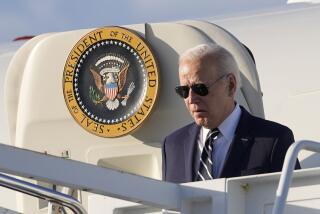Obama, Romney campaigns briefly touch on foreign policy
RENO — As Republican Mitt Romney prepared to set off on a three-country, seven-day grand tour abroad, the presidential campaigns ventured into relatively new territory Monday: engaging in a debate over foreign affairs, international alliances and war policy.
The long-distance discussion was cursory yet notable for appearing at all in a race that has been dominated by competing economic strategies and traded accusations of cronyism and financial secrecy.
President Obama’s campaign transitioned quickly, accusing Romney of harboring a “secret” foreign policy, and pushing him to detail his plans to end the war in Afghanistan and his approach to Russia and Israel. The Romney campaign responded by saying the president had eroded key alliances and promising Romney would “restore the pillars of American strength.”
In a speech to the Veterans of Foreign Wars convention in Reno, Obama portrayed his foreign policy record as one of promises fulfilled, and he took veiled jabs at Romney and other critics of his withdrawal of U.S. troops from Iraq and drawdown of troops from Afghanistan.
Romney has blasted both policies, suggesting they were motivated more by politics than circumstances on the ground, but he has not clearly stated an alternative. He has yet to publicly endorse the NATO plan to withdraw combat troops by the end of 2014, although he says he supports that time frame.
“Some said that bringing our troops home last year was a mistake. They would have kept tens of thousands of our forces in Iraq indefinitely, without a clear mission,” Obama told the veterans. “Well, when you’re commander in chief, you owe the troops a plan. You owe the country a plan, and that includes recognizing not just when to begin wars but also how to end them.”
“We’re not just ending these wars; we’re doing it in a way that achieves our objectives,” he said.
It was an especially difficult day for Obama to make his case. As he spoke, Iraqi officials were counting the dead from a wave of attacks across the country, killing more than 100. It was the deadliest day in Iraq in two years, and raised new concerns about the resurgence of an Al Qaeda-linked group.
White House spokesman Jay Carney condemned the attacks, but maintained that Iraqi security forces trained by U.S. troops “have the capacity to handle their own security.”
Obama also used his speech to indirectly attack Romney’s suggestion that veterans be offered vouchers to pay for private healthcare. “I will not allow VA healthcare to be turned into a voucher system, subject to the whims of the insurance market,” he said. “You don’t need vouchers. You need the VA healthcare that you have earned and that you depend on.”
Romney is expected to outline his own foreign policy views to the VFW on Tuesday before traveling to London, where he will attend the opening ceremony of the Olympics and meet with Prime Minister David Cameron. He heads from there to Israel and Poland. Romney is slated to deliver public remarks, but his campaign has said he will not make major announcements and will be mindful of the tradition of not criticizing U.S. leaders while abroad.
Both campaigns scrambled to frame their foreign policy issues before Romney left U.S. soil.
In a conference call with reporters, former Obama administration officials argued that Obama has strengthened alliances and downplayed recent friction with Russian President Vladimir Putin and a series of public clashes with Israeli Prime Minister Benjamin Netanyahu.
Colin Kahl, a former deputy assistant secretary of Defense for the Middle East, called the administration’s support for Israel “unprecedented” and defended the president from critics who have noted that Obama has not traveled to the country as president.
“I think we can expect him to visit Israel in the second term, should he be reelected. More importantly, being a friend to Israel, at least in our view, shouldn’t be judged purely by a travel itinerary,” Kahl said, calling such complaints a distraction.
Romney’s campaign responded by issuing a statement from House Majority Leader Eric Cantor, who called the promise “four years too late.”
“Our relationship with Israel should be a priority, not a distraction. President Obama has found time to visit dozens of other nations — including some near to Israel in the Middle East — and his treatment of our closest ally in the region has been profoundly disappointing,” the Virginia Republican said.
kathleen.hennessey@latimes.com
Times staff writer Maeve Reston contributed to this report.
More to Read
Start your day right
Sign up for Essential California for news, features and recommendations from the L.A. Times and beyond in your inbox six days a week.
You may occasionally receive promotional content from the Los Angeles Times.







